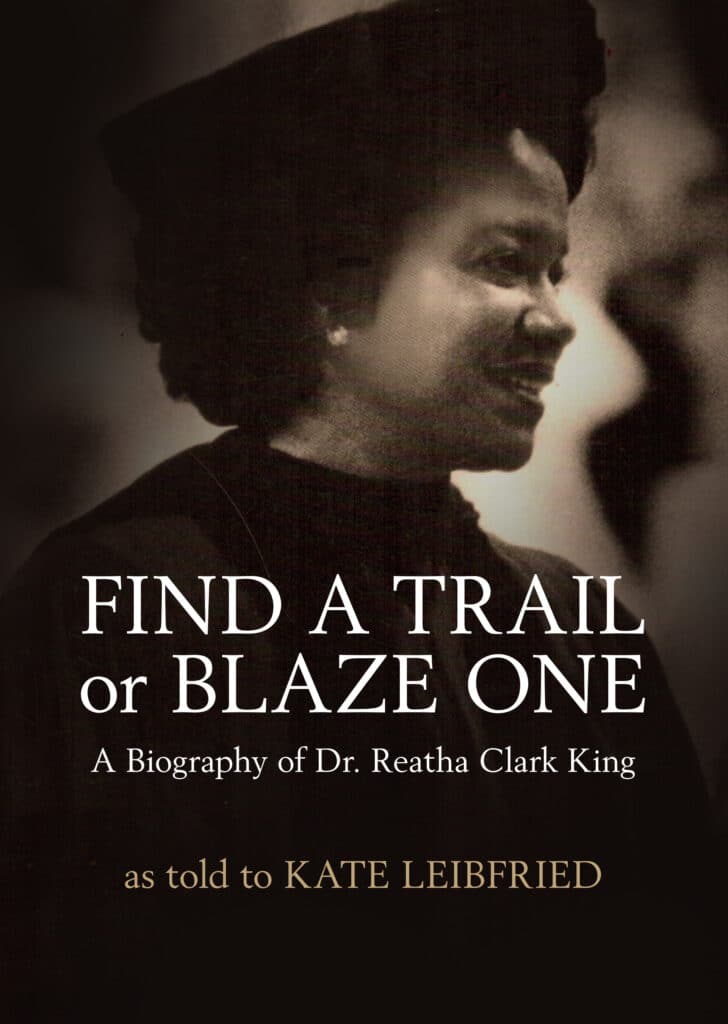Kate Leibfried, author of Find a Trail or Blaze One: A Biography of Dr. Reatha Clark King
General Nonfiction Category sponsored by The Duchess Harris Collection
Each week leading up to the 34th annual Minnesota Book Awards Ceremony, we are featuring exclusive interviews with our 36 finalists. You can also watch the authors in conversation with their fellow category finalists here.

Would you tell us one or two things about your finalist book that you are particularly proud of, and why?
First of all, I would like to acknowledge the role of Dr. Reatha Clark King, her family, and her colleagues in this project. They participated in many hours of interviews and answered my questions with candor, illustrative stories, and profound insights. It was the honor of a lifetime to work with Dr. King, who is truly a living legend. I would also like to thank Metropolitan State University for sponsoring this project and providing access to several valuable research materials.
I am particularly proud of the depth of research that went into this book. In addition to conducting interviews, I read hundreds of books and articles that were germane to Reatha Clark King’s life and provided context for her story. My list of sources is 43 pages long. Such an extensive catalog of sources took careful management and organization, and I’m happy to say I pulled it off!
What do you hope that your audience learns or takes away from your book?

Above all, I want readers to understand how much adversity Reatha Clark King faced in her journey to the top. She didn’t have the luxury to make mistakes; there were no second chances. As a representative of both her gender and her race, she had to perform flawlessly and keep her reputation squeaky clean to pave the way for other women and people of color. She felt this pressure acutely in every role she held. She felt it in the chemistry lab, as she performed groundbreaking (and dangerous!) experiments that contributed to NASA’s 1960s space program. She felt it as the Dean of York College and the President of Metropolitan State University, as she guided each institution through formative times of growth. She felt it in the board room and as the Vice President of General Mills, a company with an international presence and a net worth in the billions. A lesser person would have crumbled under the immense pressure placed on Dr. King, but she rose to the occasion and made history. I hope those who read her biography can appreciate the magnitude of her journey and the high stakes she faced along the way. Her story fits into a wider narrative of our nation’s ongoing struggle for gender and racial equality.
What advice would you give to an aspiring writer with an interest in your category?
Practice your writing daily, join a writing critique group, and don’t be afraid of criticism or critique. That’s how you grow. I have authored a dozen books and hundreds of articles, and I’m still learning and growing as a writer. That’s the beauty of writing–there’s always room for improvement. Also, read. Read constantly, across all genres.
Tell us something about yourself that is not widely known.
In my “other life,” I write speculative fiction under the pen name Kate Bitters. Writing fiction challenges me in a different way, but many of the same skills apply across genres.
Another fun fact: I am active in the local cycling community and have won a handful of races.
Minnesota enjoys a reputation as a place that values literature and reading. If this sentiment rings true for you, what about our home state makes it such a welcoming and conducive place for writers?
Minnesota has a uniquely vibrant literature and writing scene, and I’ve had the honor of working with some incredibly talented writers. It’s difficult to pinpoint the genesis of our love of literature, but it may have something to do with the long winters. When we’re cocooned in our homes, it feels natural to read, write, and reflect. Our focus turns inward, and that can prompt profound creativity.
Since the onset of the pandemic in early 2020, virtually everything about our lives has changed in some way. Has COVID-19 (and its fallout) impacted your writing habits and preferences? Has the unique zeitgeist of the past two years influenced your writing output in any other ways that you can pinpoint?
At the beginning of the COVID pandemic, I was in the throes of writing the first draft of Reatha Clark King’s biography. For me, isolation contributed to my productivity. With no social events on the calendar, I could throw my whole self into this project. It was also a great distraction from the troubling daily news.
Now that we’re tiptoeing toward the two-year marker of the COVID pandemic, I’m frankly exhausted. I feel as if the pandemic has ground down some of my edges, and it’s more difficult to find motivation and sparks of inspiration. To energize myself and my writing, I try to stay connected with friends and family members, I only occasionally check the news, and I spend more time reading. I have also found that a change of scenery (even working in a different place in my house) can prompt creativity. Another way I motivate myself is by setting timers and writing against the clock. During these timed writing sessions, I don’t worry much about grammar or punctuation; the idea is simply to get words onto the page.
Kate Leibfried is the author of several works for children and adults under her own name and the pseudonym Kate Bitters. In addition, she has ghostwritten six full-length books and hundreds of newsletters, articles, and eBooks.

